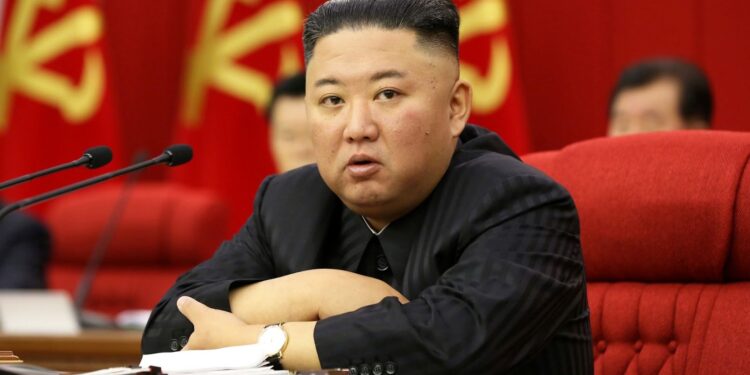In a lengthy speech concluding a five-day meeting of the ruling Workers’ Party of Korea, North Korean leader Kim Jong Un renewed threats of a nuclear attack on South Korea and ordered the acceleration of military preparations for an imminent “war,” as reported by the state news agency KCNA on Sunday.
Kim strongly criticized the United States during the meeting, where the party announced plans to launch three new spy satellites in 2024, develop military drones, and enhance electronic warfare capabilities.
Despite Pyongyang successfully orbiting a military spy satellite in November, claiming to provide images of both US and South Korean military sites, Kim expressed dissatisfaction with the perceived threats from the United States. This year, North Korea conducted a record number of weapons tests, including the launch of its most powerful intercontinental ballistic missile (ICBM).
Accusing the United States of posing “various kinds of military threats,” Kim ordered the military to closely monitor the security situation on the peninsula and respond with an “overwhelming attitude.” He stated that a war could erupt at any moment due to the “reckless movements of enemies seeking to invade us.”
Amid rising nuclear and missile threats from Pyongyang, South Korea, Japan, and the United States strengthened defense cooperation in 2023. They recently activated a system for real-time data sharing on North Korean missile launches.
Earlier this month, a US nuclear-powered submarine arrived in the South Korean port of Busan, and Washington sent long-range bombers for joint maneuvers with Seoul and Tokyo. North Korea condemned the strategic weapon deployments, such as B-52 bombers, during joint exercises on the Korean Peninsula as “intentionally provocative actions by the United States for nuclear war.”
In response to the perceived crisis, Kim ordered swift preparation for a potential nuclear emergency, mobilizing all physical means and forces, including nuclear capabilities, to pacify the entire territory of South Korea.
Kim declared an “uncontrollable crisis situation,” signaling a departure from seeking reconciliation and reunification with South Korea. He blamed Washington and Seoul for triggering a “persistent and uncontrollable crisis” on the peninsula. Relations between the two Koreas worsened after the North launched a spy satellite, leading to a partial suspension of the 2018 military agreement by Seoul.
Kim also instructed the reorganization of departments handling border affairs to “radically change direction.”
International relations expert Leif Easley suggested that North Korea’s emphasis on its “significant nuclear capabilities” was a diversion from the country’s limited economic achievements in the past year. He noted that Pyongyang’s bellicose rhetoric served domestic and international coercive purposes.
Claiming irreversible nuclear status last year, North Korea contends that its nuclear program is crucial for its survival. Despite several UN Security Council resolutions urging a halt to ballistic and nuclear programs since its first nuclear test in 2006, North Korea has persisted with its nuclear ambitions.










